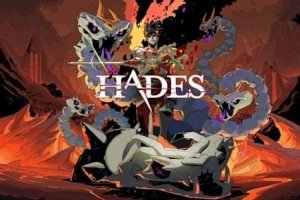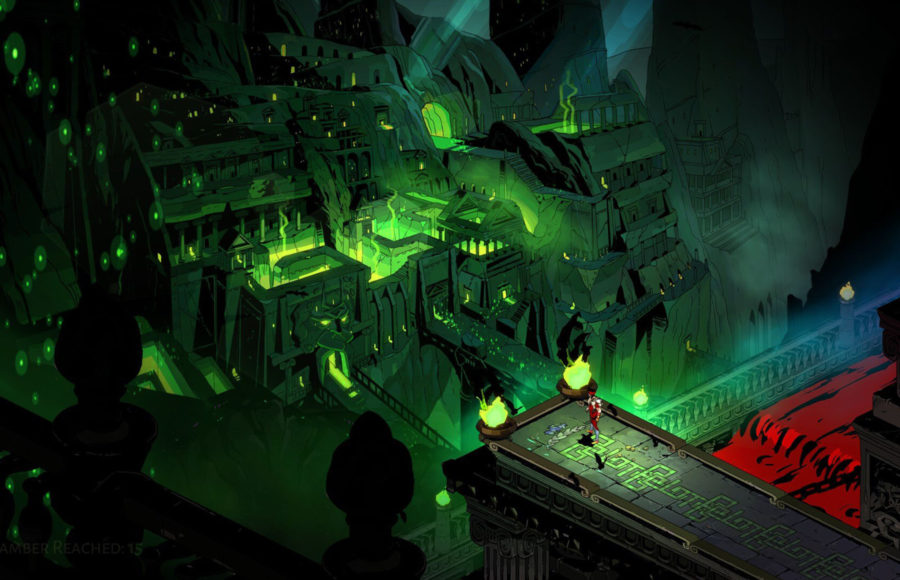Hades Review: Is it worth playing now?

Hades released in 2018 to wideaspread acclaim, touted as the new gold standard of the rogue-like formula. With addicting gameplay, compelling characters and story, and a fiendishly addicting loop that kept gamers glued to their consoles, Hades won multiple awards and accolades.
But is Hades worth playing now? Let’s find out…
(Update: You can now buy the very nice boxed version of Hades here.)
The Good

Gameplay: The concept of Hades is simple – you’re the son of Hades, Lord of the underworld, and you’re sick of your dad’s attitude. You desire to escape to the surface, so you battle your way through the various layers to the surface. Only Hades himself isn’t a fan of this idea, so commands his legions of minions to stop you. Of course, because you’re the son of the devil you can’t truly die, so each time you perish you float down the river Styx and become reborn in Hades’ underworld mansion, ready to go again. With each attempt, you’re able to gradually unlock a multitiude of things that make each subsequent attempt slightly easier; stat improvements, weapon unlocks, perks, and of course you progress the brilliant story, with each character having something new to say every time you respawn.
This loop makes for an addictive and satisfying experience. Unlike a lot of rogue-likes, each run feels like it’s been worthwhile, no matter how brief, as there’s always something new to experience after a death, even if it’s just a few bits of story progression. It’s a lovely feeling, particularly if you manage to beat one of the layers of the Underworld and progress to a new, unexplored level. It’s often hard to tell in these games whether it’s your own skill improving that allows you to progress further, or if it’s thanks to the perks and buffs you’ve gradually acquired, but in Hades it’s definitely both – and in the endgame you can test how much your skills have grown by stripping away your perks and attempting to escape, which yields more rewards if successful.
Characters: It’s the cast of Hades that really makes the game stand out. The Pantheon of Olympian and Cthonic Gods are brilliantly written and acted, with Zagreus’ relaitonship with each of them developing and blossoming as you play through the game. The Cthonic Gods that wander the Halls of Hades back in the hub world each have their own administrative role that Zagreus helps them out with, and non-diety characters like mini-gorgon Dusa and the hero Achilles are there to help with gifts or words of advice. The fact they aren’t always present after each run really helps make it a bit more special when they do appear, and the reams and reams of dialogue in the game ensure you’ll be playing for hundreds of hours before you encounter any repetition.
But it’s the Olympians that really shine when it comes to characterisation. They’ll appear throughout each run offering you boons to help buff your power as you make your way up to the surface. Each time you encounter them or present a gift to them it’ll progress your own mini-relaitonship with each of them, and they’re almost all captivating and compelling in ways befitting their Mythological lore. Zeus is jolly and pompous, Artemis coy and humble, Hermes dorky and intelligent, and Dionysus a touch sleazy and drunkenly charming. The level of detail into their designs is brilliant – for instance Dionysus’ design bears resemblance to Zagreus himself, and it was only through researching in my own time did I discover that Zagreus is an Orphic God considered to be a precursor to Dionysus, or the first incarnation of him, hence the resemblance in-game. Small touches like that illustrate the time and care poured into this game.
Combat: As well-crafted as the gameplay loop is, it wouldn’t work unless it was underpinned by a strong foundation of moment-to-moment controls. Thankfully, the combat in Hades is fast, fluid, responsive and deep. You have three main attacks (special, normal and a ranged magic attack), and a dodge. It’s the epitome of the ‘simple to learn, tricky to master’ mantra de velopers strive for. You’ll start out somewhat clumsily getting used to the mechanics, but in no time will be zipping around enemies and stringing combos together. Before each run, you select a weapon (which of course each get upgraded and improved via unlocks as you progress), each of which feels totally different, despite having the same three attack set-up. The bow and spear obviously encourage ranged approach to combat, whereas weapons like the the sword and gloves demand a more intense close-ranged strategy. The game has ways of encouraging you to use and upgrade each and every weapon too, and I found that being nudged towards weapons I didn’t think I’d enjoy at times resulted in me preferring them over my initial instinctive picks.
Boons form the Gods: The way the Olympian Gods augment the gameplay via the boons is a touch of genius design. Each God has their own type of Boon befitting their nature (Ares gives you strength upgrade, whereas Hermes’ upgrades relate to speed and aiglity), and combining these boons makes each run unique in its own way. The boons you pick end up affect the way you play any given run – if you’ve got something that makes your basic attack stronger, you avoid using your special; or if you’ve picked up something that gives you more gold if you finish a room quicker, you go for speed sacrificing caution. It’s another great component to help make each run feel unique and fun.

Unlockables and progression: There are just so many unlockables and reward sytems, and the vast majority of them feel worthwhile. The whole game itself is someting of an ongoing, giant unlockable; as the story gradually unfolds with each run, with the characters revealing more and more about themselves and the events surrounding Zagreus’ upbringing and his mother’s departure. What’s so impressive about the reward system is that new layers just keep appearing the deeper you go into the game. Getting to the end of your first run, something that will take a first-time player tens of hours in itself, is effectively just the beginning of the game. Different weapon aspects effectively add 5x the amount of weapon options available, perks in the Mirror of Night can be added to, until you unveil a whole alternative set that can be switched to and mix and matched with the originals.
Perhaps the most satisfying sense of unlockable progression comes from your relationships with the characters. These are generally progressed just by talking to them every time you see them, and by giving them gifts of ambrosia and nectar to win their favour. As you woo them, they provide you with entertaining nuggets of info and progress the story, and also give you gifts in return. It’s wonderful.
The Hub itself can also be developed and improved upon, via new areas unlocked and features added via spending gems you pick up on a run. Speaking of which…
The Hub: The Halls of Hades’ abode has to be one of the best in-game hubs ever made. Hades is the only game where I actually look forward to dying, just to get back to the hub area and see what’s new, and what I can unlock and upgrade. Just running around the halls is fun, seeing the little spirits gossip to each other about the underworld goings-on, and petting Cerberus for no other reason than he’s a good boy and likes a scratch.
Weapon balance: The way the weapons have been designed is another comendable achievement. It’s testament to their design that after over 100 hours with the game I really don’t have a favourite, having been incentivised to cycle through them all regularly by the excellent end-game progression system. Here you add challenges to your run (more health for bosses, double damage, fewer boons etc), each of which give you a ‘heat gaugue’ rating for that weapon on that run, which you gradually progress upward and get rewards for each level. It’s clever and a great way to reward players who want to keep going, and to master every weapon.

Art: Hades looks lovely, with each area of the Underworld possessing a distinct style and flavour. The firey pits of Asphodel burn a bright red through whispy heat haze, and Elysium – the supposed paradise of Hell reserved for heroes – holds a bizarrely beautiful but deadly design, as it’s also the most difficult layer in the game. The character designs are top notch too, particularly the three brothers Poseidon, Zeus and Hades himself particularly standing out.
Script: There’s a frankly obscene amount of voices dialogue in the game, after 100 hours I was still hearing new things from the characters. The voice acting is impressive, and the quality of both the humour and more poignant moments is high, and the relaitonships between characters are believable and convincing.
Music: The drum beat that starts up at the beginning of every run never gets tiring, and the score for each level is excellent, and Orpheus’ multitude of songs can be toggled through in the hub world and they’re all well done. The music isn’t anything incredibly groundbreaking, but it does its job well.
The Mixed

Sexy: There’s a strong sense of camp sexiness to the characters of Hades, and most of the time it works, but at certain points it just felt a little too blatant to be a bit disatracting. Aphrodite…
Cast: Your third move type, the Cast, has you shooting a red fire arrow of sorts. The annoying thing is that it has to be collected after firing to shoot it again, and it doesnt do all that much damage. You can acquire boons that make it more worthwhile, but it didn’t take long for me to ignore it altogether.
Posh Zag: Whilst I found pretty much all the characters in the game to be charming and entrtaining, something about Zagreus himself just felt a little too public-schoolboy-pompous for me to really warm to him.
The Bad

One more world: The length of one ‘run’ of the game is fine, and typically takes between 25-35 minutes, but I felt that just one more layer of hell would’ve made things feel a bit more complete. The final layer before the utimate boss is a series of mini chambers with some rather annoying enemies, which I wouldn’t mind seeing replaced with a more fleshed out layer.
Multiplayer: It doesn’t stop Hades from being a great game, but the idea of running through the Underworld with a pal is really enticing. It’s a shame there’s no option to do this.
Overall
Hades is hard to fault. I’d call it a must-play for anyone who has ever remotely enjoyed an action game. Once it clicked for me, which didn’t take long, it sunk its teeth into me and refused to let go in a way that very few games have done. As close to essential as it gets. 10/10
Check out more game reviews here.
Update: You can now buy the very nice boxed version of Hades here.